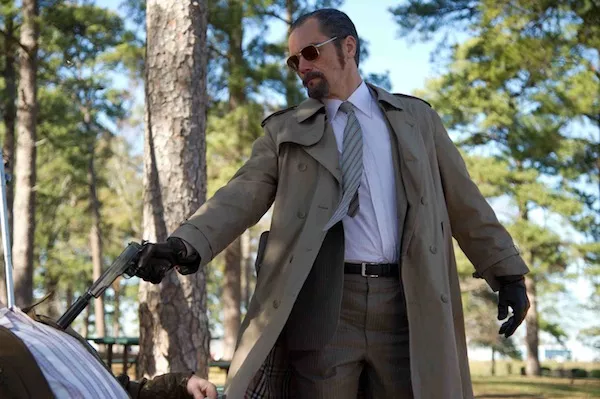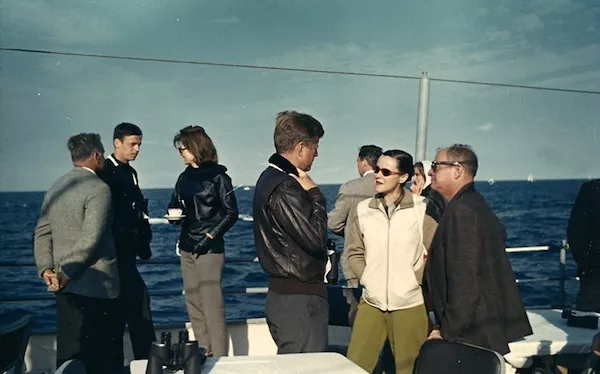Sunday, April 21, 2013
Film / Film News / Film Reviews RiverRun Report: Part 2
Posted By Matt Brunson on Sun, Apr 21, 2013 at 3:55 PM
On my second full day at the 15th RiverRun International Film Festival in Winston-Salem, I caught two movies about real-life individuals - one a fictionalized take, the other a bona fide documentary.

- Millennium
- Michael Shannon in The Iceman
THE ICEMAN - Nobody would think to call The Iceman a romanticized version of anything, but when compared to the real-life story of Richard Kuklinski, this excessively brutal film comes off almost as gentle and dreamy-eyed as a Nicholas Sparks adaptation. Kicking off in the mid-1960s, the movie stars Michael Shannon as Kuklinski, who woos and weds Deborah (Winona Ryder) while holding down a menial job dubbing porno tapes (he tells Deborah that he dubs cartoons for a living). An encounter with crime boss Roy DeMeo (Ray Liotta) leads to him working as a hit man for the mobster, and once that relationship begins to sour, he teams up with another killer-for-cash (Chris "Captain America" Evans, unrecognizable under all that ratty hair) for more murderous mayhem. Over the course of approximately two decades, Kuklinski kills over 100 people, and the sick punchline is that his wife and daughters are never the wiser, believing him to be a financial broker. The movie posits that Kuklinski did everything for the sake of his family, with the character himself saying that he only cares for Deborah and his girls and nothing else. The film also repeatedly pushes his claim that he will never hurt women and children, preferring instead to only murder men - and even then mainly for monetary gain. In real life, though, Richard Kuklinski was more of a serial killer than a paid assassin - he enjoyed the art of the kill - and he would occasionally beat up his wife on the side. Writer-director Ariel Vromen and co-writer Morgan Land, adapting both Anthony Bruno's book and an HBO documentary, naturally need to streamline actual events for the sake of a coherent movie that clocks in with an acceptable running time, but in this case, they have marginally softened the character while also jettisoning many elements that would have made this picture unique. As it stands, this largely plays out as a formulaic mob flick, full of messy double-crosses, tough-guy patter, secretive meetings in big limos, debts that must be repaid in blood ... you get the drift. Shannon delivers an appropriately steely performance, but since his character isn't inherently interesting, he can only provide so much of a center to the movie. The supporting roles are all well-cast - Robert Davi is especially memorable as a gangland in-between, and the prolific James Franco pops up in one particularly distinctive sequence - but even the heat these actors are packing isn't enough to thaw out the picture's frosty approach.

- Laemmle/Zeller Films
- George Plimpton (second from left) hanging out with Jackie Kennedy (third from left) and JFK (center).
PLIMPTON! STARRING GEORGE PLIMPTON AS HIMSELF - One of the true delights at this year's festival, Plimpton! admittedly has it easier than many other documentaries: When a movie's leading character is as fascinating as the one showcased here, then half the work is already done before the project's even conceived. Co-directors Tom Bean and Luke Poling have constructed a smart nonfiction piece that uses relevant talking-head interviews and reams of valuable archival footage to paint as much of a portrait of George Plimpton as can fit into a 90-minute running time. After all, a multi-part TV documentary would be a more appropriate format, given the wild, wild life enjoyed - and sometimes endured - by Plimpton (who died in 2003). Hailing from a distinguished New England clan whose family tree had deep roots and included all manner of politicians, lawyers, military leaders and more, George's background and natural curiosity as a young boy didn't translate into him becoming a titan of industry or a leader of men, as his demanding father had hoped. Rather, Mr. Plimpton frowned on some of the early occurrences in George's life, including his getting booted from the prestigious Exeter Academy and, years later, becoming the first editor-in-chief of The Paris Review. But while Pop may have disapproved of his son's involvement with what he viewed as a sub-par publication, George carefully cultivated the landmark literary magazine into not only a welcome mat for early works from upcoming writers (among them Philip Roth and Jack Kerouac) but also a periodical that printed invaluable writing columns from established authors like E.M. Forster and Ernest Hemingway. Plimpton's lifelong devotion to The Paris Review would have been enough of a historical distinction for any person, but he wasn't about to stop there. Instead, he decided to take part in all sorts of activities in able to accurately relate the experiences to readers. He boxed against Archie Moore. He pitched against Willie Mays. He was a third-string quarterback for the Detroit Lions (this led to the publication of his bestselling classic, Paper Lion). He was a goalie for the hockey team the Boston Bruins. He appeared in several movies, including opposite John Wayne in Rio Lobo. He briefly joined the circus as a trapeze artist. Oh, yes, he also nabbed the ultimate status symbol by appearing in an episode of The Simpsons. And that's just the tip of the iceberg. From his actions at Senator Robert Kennedy's assassination to his famous celebrity parties (one photo in the film shows him hosting a shindig populated by, among others, Truman Capote, Mario Puzo, Gore Vidal, Terry Southern, Ralph Ellison; you know, just your typical roster of party guests), George Plimpton seemingly approached life as if it were a buffet table, and this compelling documentary manages to offer a sizable sampling.
Speaking of...
Latest in The CLog
More by Matt Brunson
-

Fanning flames of expectation
Apr 26, 2019 -

That burning sensation
Apr 19, 2019 -

Gentle giant
Apr 19, 2019 - More »









